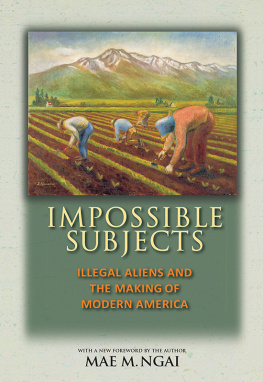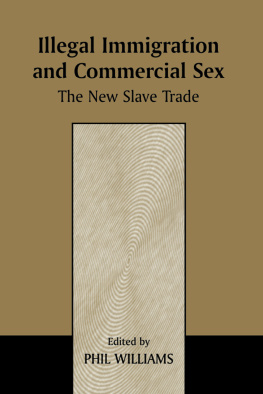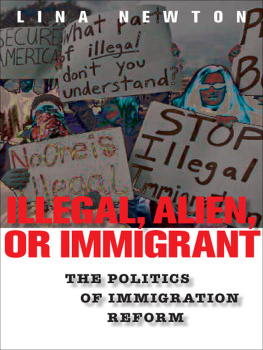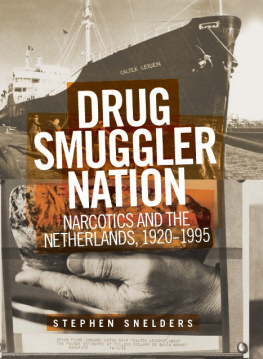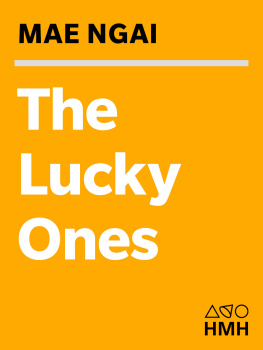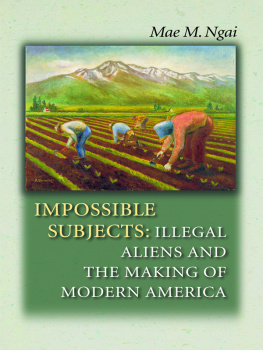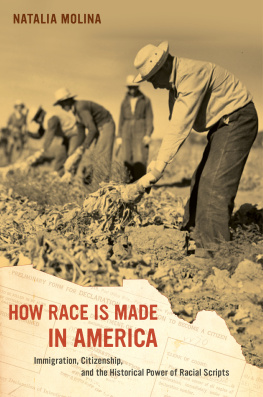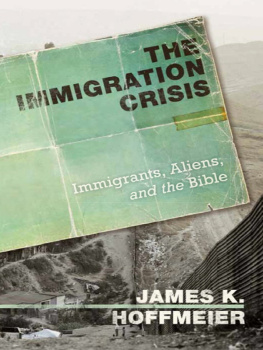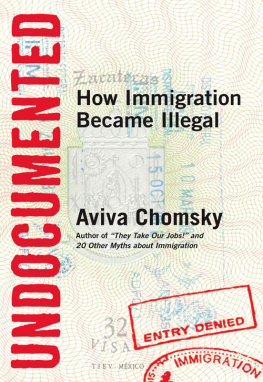
IMPOSSIBLE SUBJECTS
____________________________________________________
POLITICS AND SOCIETY IN TWENTIETH-CENTURY AMERICA
Series Editors
WILLIAM CHAFE, GARY GERSTLE, LINDA GORDON, AND JULIAN ZELIZER
A list of titles in this series appears at the back of the book
Mae M. Ngai
IMPOSSIBLE SUBJECTS
ILLEGAL ALIENS AND THE MAKING OF MODERN AMERICA
PRINCETON UNIVERSITY PRESS PRINCETON AND OXFORD
Copyright 2004 by Princeton University Press
Published by Princeton University Press, 41 William Street, Princeton, New Jersey 08540
In the United Kingdom: Princeton University Press, 6 Oxford Street,
Woodstock, Oxfordshire OX20 1TW
All Rights Reserved
First printing, 2004
Fourth printing and first paperback printing, 2005
New paperback edition, with a new foreword by the author 2014
Paperback ISBN 978-0-691-16082-5
Library of Congress Control Number 2013957460
British Library Cataloging-in-Publication Data is available
This book has been composed in Minion Typeface
Printed on acid-free paper.
www.press.princeton.edu
Printed in the United States of America
10 9 8 7 6 5 4 3 2 1
To the memory of
Shihhsun Ngai
and to
Hsueh-hwa Wang Ngaiand
Michael S. Hing
It has always been easier, it always
will be easier, to think of someone as
a noncitizen than to
decide that he is a nonperson.
ALEXANDER BICKEL, Citizenship in the American Constitution
Table of Contents
Introduction
Illegal Aliens: A Problem of Law and History |
One
The Johnson-Reed Act of 1924 and the Reconstruction of Race in Immigration Law |
Two
Deportation Policy and the Making and Unmaking of Illegal Aliens |
Three
From Colonial Subject to Undesirable Alien: Filipino Migration in the Invisible Empire |
Four
Braceros, Wetbacks, and the National Boundaries of Class |
Five
The World War II Internment of Japanese Americans and the Citizenship Renunciation Cases |
Six
The Cold War Chinese Immigration Crisis and the Confession Cases |
Seven
The Liberal Critique and Reform of Immigration Policy |
Figures and Illustrations
Tables
Acknowledgments
THIS BOOK has multiple histories. One is common to many first academic books: it began as a humble graduate school seminar paper, evolved into a dissertation, and then, with expansion and revision, finally matured into a book that one sends into the world with hopes that thoughtful people will find in it something useful. But it also has another genealogy, with origins not in the university but in family and community. As the daughter of Chinese immigrants, I grew up in a home where being Chinese and being American existed in tension, but not in contradiction. I later spent not a few years in New Yorks Chinatown community and labor movement as an activist and professional labor educator. In many ways my experience with immigrant workers and their struggles for legitimacy and equality motivated and sustained this study.
Nevertheless, this has been principally a project of historical scholarship, and I am indebted, first, to my teachers. At the State University of New Yorks Empire State College, the mecca of returning students, Robert Carey reintroduced me to reading history and suggested that I might think about going to graduate school. I thank my professors at Columbia University who taught me to read and write history: Elizabeth Blackmar, Alan Brinkley, Richard Bushman, Barbara J. Fields, Joshua Freeman, and Ira Katznelson. My biggest debt is to my advisor, Eric Foner, a great scholar, model teacher, and committed public intellectual, who took a chance by admitting a union organizer to the graduate program.
Many archivists and librarians eased my way through the labyrinths of archival research. I thank Robert Ellis at the National Archives in Washington; Waverly Lowell at the National Archives, Pacific regional branch, in San Francisco, California; Dr. Dorothy Cordova at the Filipino American National Historical Society in Seattle; Margo Guterrez at the Bensen Latin American Collection at the University of Texas-Austin; and the archivists and librarians at the Bancroft Library at the University of California-Berkeley; the National Archives at College Park, Maryland, and Northeast regional branch in New York City; the presidential libraries of Harry S. Truman, Lyndon Baines Johnson, and John F. Kennedy; the Herbert Lehman Library at Columbia University; the U.S. Library of Congress; the George Meany Memorial Archives in Silver Spring, Maryland; the Walter Reuther Labor and Urban History Archives at Wayne State University; and the Immigration History Research Center at the University of Minnesota.
I am especially grateful to the U.S. Immigration and Naturalization Service for granting me access to its subject files. As all historians know, it is a rare fortune to have the opportunity to consult previously unresearched records. This project would not have been possible without INS historian Marian Smiths commitment to the scholarly research of INS records. I am most grateful for her professionalism, patience, and good cheer during the months that I spent in her library and in response to the many queries I made during the years since. I thank Crystal Williams for her help with INS illustrations. Most (although not all) of the records I consulted at the INS central office have since been transferred to the National Archives in Washington (Record Group 85). At this writing much of the collection remains unprocessed, but researchers may request documents according to the information in my citations. Records that remain in the custody of the INS are so indicated.
Generous fellowships and grants supported additional research and writing of the book. I gratefully acknowledge the Social Science Research Council International Migration Program; New York University School of Law Samuel I. Goleib Fellowship in Legal History and NYU Asian Pacific American Studies; and the University of Chicago Division of Social Sciences.
I have benefited from support and constructive criticism from a wide circle of scholars in history, law, Asian American and Latino and Latina studies, and other fields. For reading all or parts of the penultimate draft of the manuscript I am grateful to Linda Bosniak, Gordon H. Chang, David L. Eng, Cindy Hahamovitch, Victoria Hattam, Matthew Jacobson, and Leti Volpp. Many people helped me by directing me to sources, reading drafts, correcting errors, and sharing their ideas and their own works in progress with me, and I thank them all: Jacqueline Bhabha, Beth Bates, Susan Carter, Gabriel J. Chin, Michael Dawson, Nicholas DeGenova, Mary Dudziak, Tami Friedman, Neil Gotanda, Ramn Guterrez, Charles Hawley, John Higham, Madeline Hsu, Erika Lee, Him Mark Lai, Adam McKeown, Rebecca McLennan, Nancy Morawetz, Gerald Neuman, Brian Niiya, Franklin Odo, Gary Y. Okihiro, Kunal Parker, Marc Simon Rodrguez, David Roediger, Teemu Ruskola, Lucy Salyer, George Snchez, Dorothee Schneider, Paul A. Schor, Nayan Shah, Betty Lee Sung, Richard Sutch, John Kuo-wei Tchen, Christopher Tomlins, John Torpey, Dorothy Wang, Patrick Weil, Kevin Scott Wong, Kariann Yokota, Henry Yu, Michael Zakim, and Aristide Zolberg. I am saddened that Yuji Ichioka, who encouraged and advised me over the years, passed away before this book was published.
Colleagues in history and in other disciplines at the University of Chicago have become some of my closest interlocutors. For their intellectual generosity and collegiality I thank Danielle Allen, Leora Auslander, Kyeong-hee Choi, Cathy Cohen, Bruce Cumings, Prasenjit Duara, Norma Field, Michael Geyer, Friedrich Katz, Emilio Kouri, Tetsuo Najita, William Novak, Julie Saville, Saskia Sassen, and Amy Dru Stanley. I wish to especially thank Thomas Holt and George Chauncey for their mentorship and Kathleen Neils Conzen, chair of the Department of History, and Richard Saller, former dean of the Division of Social Sciences and now provost of the university, for both intellectual and institutional support. I thank Aaron Shapiro, Deborah Cohen, Michael Stamm, and Michael Hing for research assistance.
Next page
